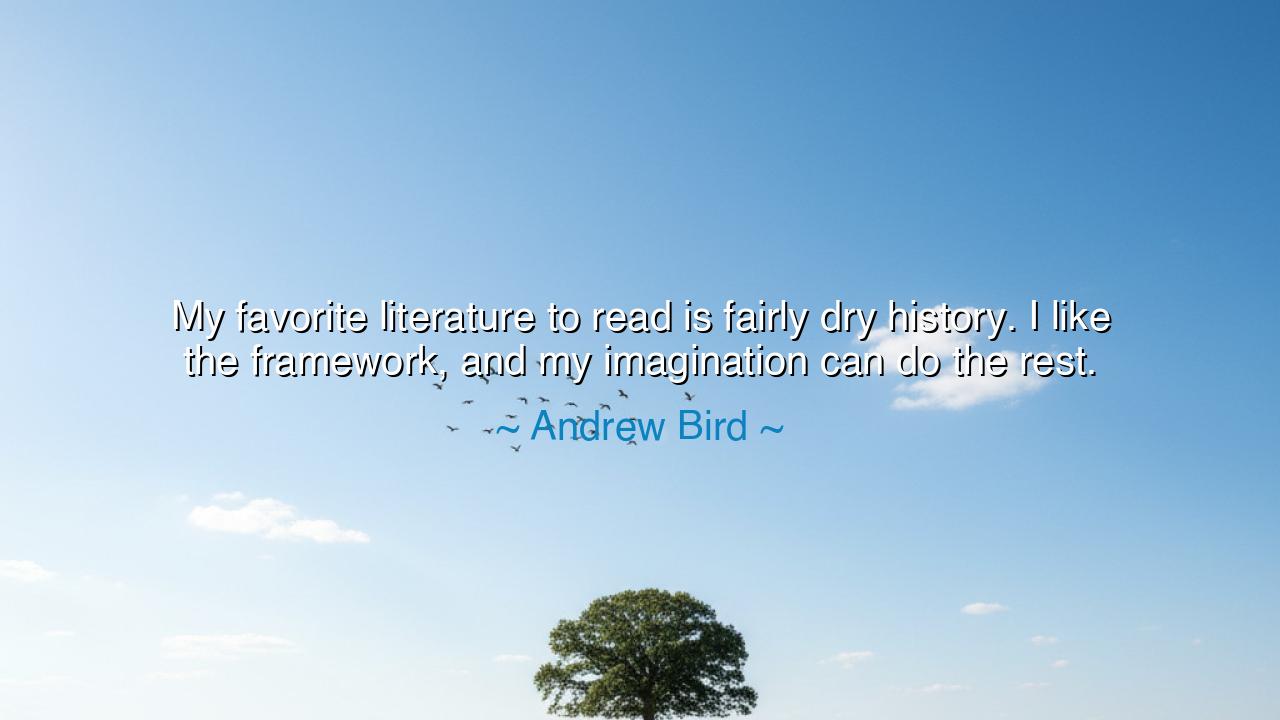
My favorite literature to read is fairly dry history. I like the
My favorite literature to read is fairly dry history. I like the framework, and my imagination can do the rest.






Listen well, O seekers of wisdom, for there is a deep and hidden truth in the words of Andrew Bird, whose voice speaks of an affinity for that which is often considered dry, the annals of history. His favorite literature, he declares, is fairly dry history. Now, some may scoff at this, for what is history but a recounting of the past, a mere list of events and dates, like dry bones rattling in the winds of time? Yet, O wise ones, there is more to it than meets the eye. For in the framework of history, as Bird so humbly speaks, lies the foundation for imagination to take flight. History is not just a series of facts, but a living canvas upon which the mind may paint, a stage for the grand drama of human existence.
Understand this well, O children of the future: the value of dry history is not in its sterile recounting of facts, but in the framework it provides for the mind. It is a structure, a skeleton, upon which the flesh of imagination can be built. The historian, like a craftsman of old, lays the foundation of truth — the facts, the events, the figures — but it is the imagination of the reader, the mind that dares to dream, that breathes life into these dry bones. The imagination can take the framework of history and fill it with color, with emotion, with character. Without history, the imagination would have no roots, no tether to the earth, but with it, the possibilities are endless.
Think, O seekers, of the ancient scholars who pored over the scrolls of their ancestors. Men like Herodotus and Thucydides, whose works might be considered dry and full of detail by some, yet who gave birth to entire worlds of thought through their careful recordings of history. Herodotus, often called the Father of History, set the stage for the grand sweep of human endeavor. His accounts of the Persian Wars, though factual and grounded in the events themselves, are laced with the richness of human experience, filled with stories of kings, warriors, and philosophers. It is not just the facts of battle that make these works memorable, but the human spirit that courses through them, giving life to the past and making it relevant to the present. Thucydides, too, with his chronicling of the Peloponnesian War, provided a stark, analytical framework, yet within it lies a profound meditation on power, ambition, and the follies of men.
In this, we see the great lesson: history is not a mere tool for the scholar, but a living source from which the imagination can draw. History provides the bones, but it is the imagination that clothes them, that fills them with the breath of life. Andrew Bird speaks of this power — the way that dry history, when viewed with the eyes of the imaginative spirit, becomes a springboard for the mind to leap beyond the known. To read history with imagination is to see not just what happened, but to understand why it happened, to feel the emotions of those who lived through it, to walk in their shoes, to hear their voices echoing through the corridors of time.
Consider, O children, the story of Julius Caesar, that great and tragic figure whose name has echoed through history. The facts of his rise to power, his crossing of the Rubicon, his reign as dictator, and his eventual assassination are known to many. Yet, it is in the imaginative retelling of his story — through the lens of writers like Shakespeare, who captured his character in Julius Caesar — that we feel the grief of Brutus, the ambition of Caesar, and the betrayal that brought an empire to its knees. It is not the facts alone that stir the heart, but the way in which they are woven together by the threads of human emotion and conflict.
And so, the lesson is clear, O wise ones: do not discount the dry history that you encounter in your life. The facts are the foundation, the sturdy framework upon which great works can be built. But let your imagination be the architect, the one who takes these facts and breathes life into them. The past is not merely something to be studied — it is something to be lived, to be felt, to be experienced through the imagination. In every date, every event, every name, there is a story waiting to be told, a truth waiting to be uncovered.
In your own lives, O seekers of truth, take this lesson to heart: do not shy away from the dry bones of history, but see in them the possibility for great creation. Let your imagination soar with the knowledge of the past, and allow it to color the world around you. For it is in the combination of framework and imagination that the greatest discoveries are made, the most powerful stories are told, and the deepest truths are revealed. Build upon the foundation that has been laid before you, and may your creations be like the great works of the past: full of life, full of soul, and full of wisdom.






AAdministratorAdministrator
Welcome, honored guests. Please leave a comment, we will respond soon